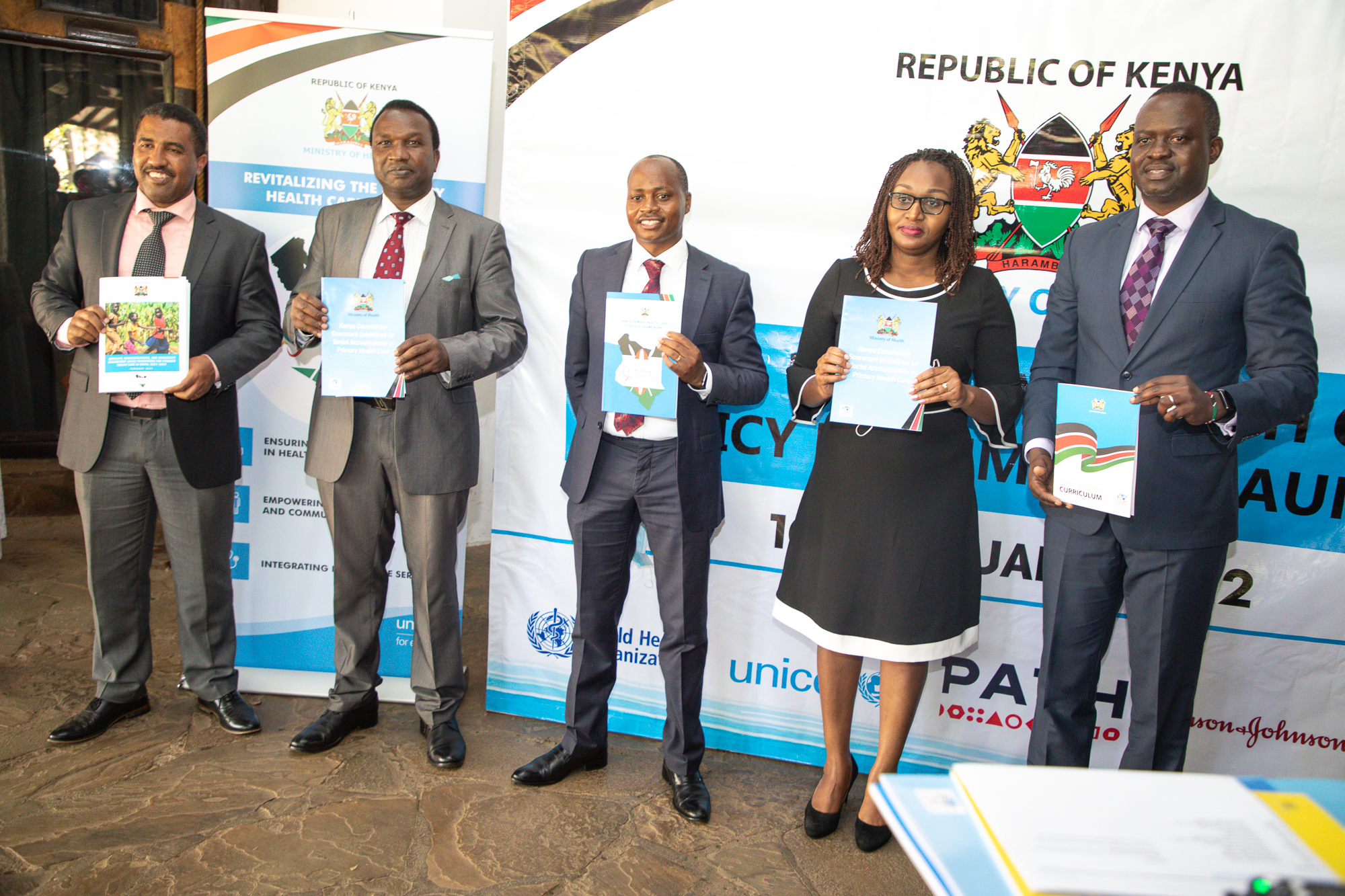
Advocating for stronger primary health care systems in Kenya

From left: Anthony Gitau, Director, Johnson & Johnson Global Community Impact for Sub-Saharan Africa; Dr. Simon Kibias, Ag. Head Directorate of Health Standards, Quality Assurance and Regulation, Kenya Ministry of Health; Dr. Andrew Mulwa, Ag. Director, Medical Services, Preventive and Promotive Health Services, Kenya Ministry of Health; Carolyne Njuguna, Country Director, PATH Kenya; and Thomas Onyango, Country Director, Living Goods hold copies of the newly launched PHC policies and guidelines. Photo: PATH/Jacqueline Achieng.
This post originally appeared in the PHCPI website. Read this fact sheet to learn more about PATH’s implementation of Kenya’s PHC policy.
Primary health care (PHC) is the most basic package of essential health services and products needed to prevent disease, promote health, and manage illness. In the case of preventing and treating diarrheal disease, PHC includes basic child health tools like immunization, oral rehydration solution and zinc, and health education for parents. Read about how Kenya is advancing PHC with a new framework.
“A building is only as strong as it’s foundation. The foundation for universal health coverage (UHC) in Kenya is primary health care (PHC),” said Dr. Andrew Mulwa, Director, Medical Services, Preventive and Promotive Health at Kenya’s Ministry of Health at the launch of Kenya’s new set of PHC policy documents and guidelines.
Earlier this year, the government of Kenya took great strides toward strengthening the foundation of the country’s health system when the president launched the national scale-up of UHC with a call for all to register for the National Health Insurance Fund (NHIF). The Ministry of Health followed suit by launching a set of policies and guidelines to support counties in strengthening primary health care service delivery. The launch of the set of PHC policies and guidelines exemplifies a successful joint effort between a variety of stakeholders and led by Kenya’s Ministry of Health PHC division.
Now launched, the new set of PHC policies and guidelines will serve as a tool for implementing Kenya’s PHC Strategic Framework 2019-2024 and further solidify the country’s commitment to PHC following their 2018 signing of the Declaration of Astana. Among the key documents launched were Primary Health Care Network Guidelines which calls for the establishment of the primary care networks (PCNs), a sound approach toward effective implementation of the Strategic Framework. The model, which the government plans to use to scale up and improve the delivery of primary care services, is already being rolled out in a handful of counties: Garissa, Kisumu, Makueni, Kilifi, and West Pokot. These pioneer counties are already showing promising results in improved efficiency and effectiveness of resources for delivery of PHC services, better coordination through integrated primary and public health care, enhanced community ownership of health services, and improved availability and access of high-quality essential health services.
A collaborative approach to policy creation
The development of policy documents is a lengthy process involving many stakeholders, and the process of creating Kenya’s PHC policy documents was no exception. The Ministry of Health tapped into the unique expertise of different partners, including PATH, UNICEF, Amref Health Africa, Living Goods, Thinkwell, and Johnson & Johnson, among others, to help shape the documents. This collaborative approach resulted in the creation of a set of policy documents that addresses the unique needs of communities, captures county voices, and adapts to local contexts for ease of implementation.
The newly launched PHC policy documents lay a framework for which all health sector players can accelerate efforts to improve access to primary health care services for Kenyans. Successful implementation will create avenues for engaging with communities to improve their health, allow for multi-sectoral involvement, and tailor effective communication around preventive and promotive health care.
 Kenya’s new set of PHC policies and guidelines launched ceremoniously on February 10, 2022. Photo: PATH/Jacqueline Achieng.
Kenya’s new set of PHC policies and guidelines launched ceremoniously on February 10, 2022. Photo: PATH/Jacqueline Achieng.
The role of advocacy in advancing health systems
The inclusive development process that was adopted in the creation of the PHC documents helps ensure the policies are reflective of the needs of the communities. But, the work does not stop here. We must ensure the documents reach the hands of those who need them and that county governments are held accountable for their implementation. That’s where advocacy comes in.
Advocates play a critical role in ensuring that policies do not just sit on shelves and gather dust at the national Ministry of Health offices but that they are sufficiently disseminated, prioritized in development plans, resourced in budgets and financial plans, and that stakeholders are educated on their content and empowered to hold their leaders accountable.
Lessons and opportunities around advocacy for PHC in Kenya
Through the PHC policy documents, advocates have an opportunity to find innovative ways of supporting county peer-to-peer learning coupled with policy dissemination for in-depth interaction with the content of the policy documents. They can also repackage policy documents into simplified versions targeting high-level decision-makers, such as members of the county assembly and empowering stakeholders—especially communities—to conduct citizen-led accountability for commitments made toward improving quality of essential services.
PATH, and our partners are already hard at work, ensuring that the new PHC documents and guidelines are widely disseminated, governments are held accountable for their implementation, and the financial pathways are in place to ensure their success.
We asked some of our partners to explain what they’re doing to advance PHC in their communities, and here’s what we heard:
PHC Advocacy Partner Video: Dr. Mercy Onsando, HENNET.
PHC Advocacy Partner Video: Joyce Ng’ang’a, WACI Health.
The reorientation of the Kenya’s PHC system requires advocacy to influence supportive policy change, resource mobilization, and implementation. We look forward to continued collaboration with the Ministry of Health and partners to encourage adoption of and use of the Vital Signs Profiles to catalyze improvements in PHC system through performance measurement and data sharing for decision-making toward quality, accessible, and affordable health care for all Kenyans.


